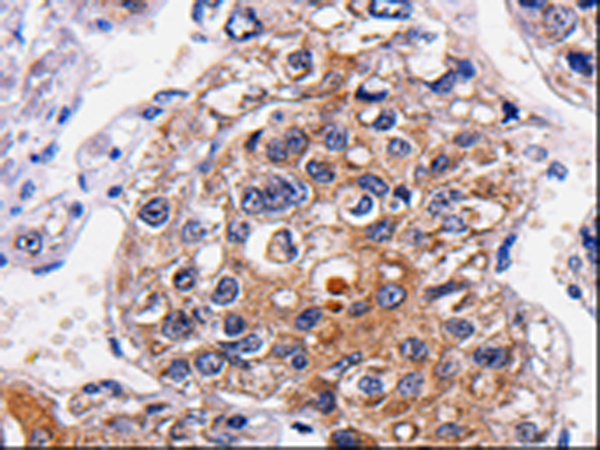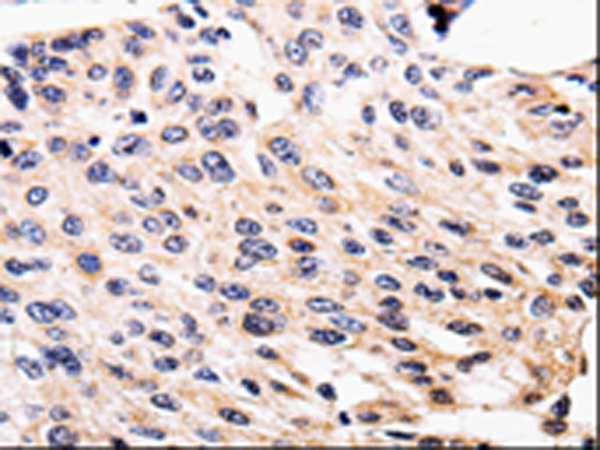

| WB | 咨询技术 | Human,Mouse,Rat |
| IF | 咨询技术 | Human,Mouse,Rat |
| IHC | 1/25-1/100 | Human,Mouse,Rat |
| ICC | 技术咨询 | Human,Mouse,Rat |
| FCM | 咨询技术 | Human,Mouse,Rat |
| Elisa | 1/1000-1/5000 | Human,Mouse,Rat |
| Aliases | CD246, NBLST3 |
| Host/Isotype | Rabbit IgG |
| Antibody Type | Primary antibody |
| Storage | Store at 4°C short term. Aliquot and store at -20°C long term. Avoid freeze/thaw cycles. |
| Species Reactivity | Human, Mouse |
| Immunogen | Synthetic peptide of human ALK |
| Formulation | Purified antibody in PBS with 0.05% sodium azide and 50% glycerol. |
+ +
以下是3-4篇与ALK抗体相关的研究文献概览:
---
1. **标题**:*Identification of the transforming EML4-ALK fusion gene in non-small-cell lung cancer*
**作者**:Soda, M. et al.
**摘要**:该研究首次在非小细胞肺癌(NSCLC)中发现EML4-ALK融合基因,揭示了其致癌性。研究通过免疫组化(ALK抗体检测)和分子生物学方法证实了ALK蛋白在肿瘤组织中的异常表达,为后续靶向治疗提供了依据(*Nature*, 2007)。
---
2. **标题**:*ALK antibodies in the diagnosis of anaplastic large cell lymphoma*
**作者**:Morris, S.W. et al.
**摘要**:研究团队克隆了ALK基因并开发了特异性抗体,用于检测间变性大细胞淋巴瘤(ALCL)中ALK蛋白的表达。结果显示ALK抗体在区分ALCL亚型和指导临床诊断中的关键作用(*Oncogene*, 1994)。
---
3. **标题**:*Clinical activity of crizotinib in patients with ALK-rearranged NSCLC*
**作者**:Kwak, E.L. et al.
**摘要**:该临床试验验证了ALK抗体筛选的ALK阳性NSCLC患者对克唑替尼的显著响应率。研究强调了ALK抗体作为伴随诊断工具在精准治疗中的应用价值(*NEJM*, 2010)。
---
4. **标题**:*ALK immunohistochemistry in pulmonary adenocarcinoma: Evaluation of standardization strategies*
**作者**:Haller, F. et al.
**摘要**:研究评估了不同ALK抗体(如D5F3和5A4克隆)在肺腺癌免疫组化检测中的敏感性和特异性,提出了标准化检测流程以提高诊断准确性(*Modern Pathology*, 2022)。
---
**备注**:以上文献涵盖了ALK抗体的基础研究、诊断应用及临床转化,部分为经典研究或高影响力论文。如需具体引用格式,请提供目标期刊要求。
ALK (Anaplastic Lymphoma Kinase) antibodies are critical tools in oncology and molecular pathology, primarily used to detect ALK protein expression and its aberrations in cancer. ALK, a receptor tyrosine kinase, is normally involved in neural development but gains oncogenic potential through genetic alterations like chromosomal rearrangements (e.g., *EML4-ALK* fusion in non-small cell lung cancer) or mutations. These abnormalities drive uncontrolled cell proliferation and survival, making ALK a key therapeutic target.
ALK antibodies are widely employed in diagnostic assays such as immunohistochemistry (IHC) and fluorescence in situ hybridization (FISH) to identify ALK-positive tumors, guiding treatment decisions. For instance, IHC using clones like D5F3 or ALK1 helps visualize ALK overexpression or fusion proteins in tissue samples. Positivity often indicates eligibility for ALK-targeted therapies, such as tyrosine kinase inhibitors (e.g., crizotinib).
Beyond diagnostics, ALK antibodies support research into ALK signaling pathways, drug resistance mechanisms, and novel therapeutic strategies. Their specificity and reliability are continually optimized to reduce false positives/negatives, ensuring accurate clinical interpretation. Despite advancements, challenges remain in standardizing assays across laboratories. Overall, ALK antibodies bridge molecular biology and clinical practice, enhancing precision oncology for ALK-driven cancers.
×